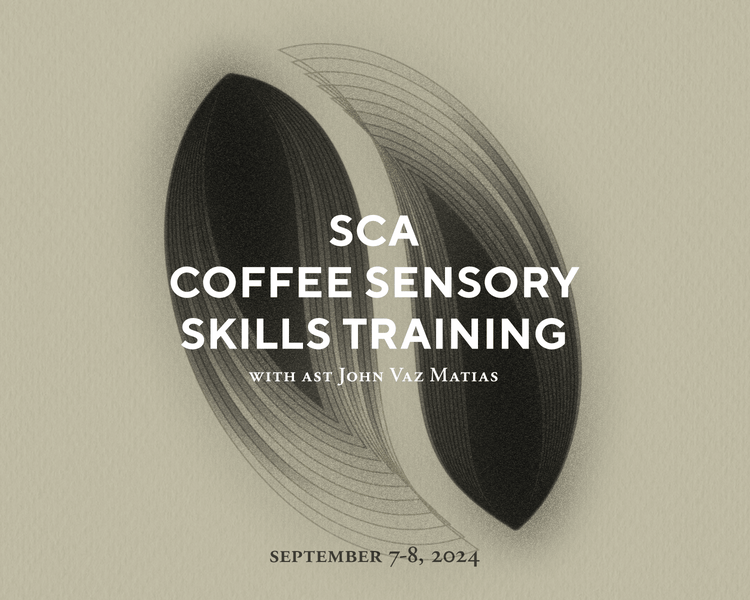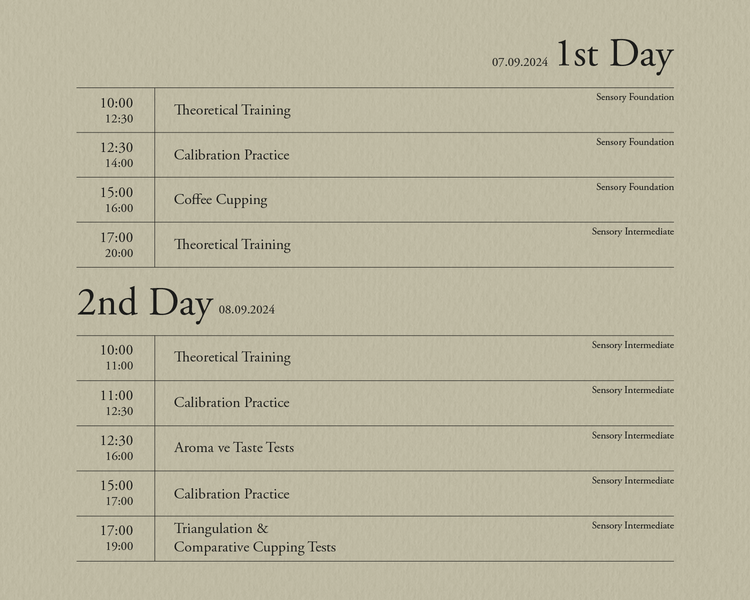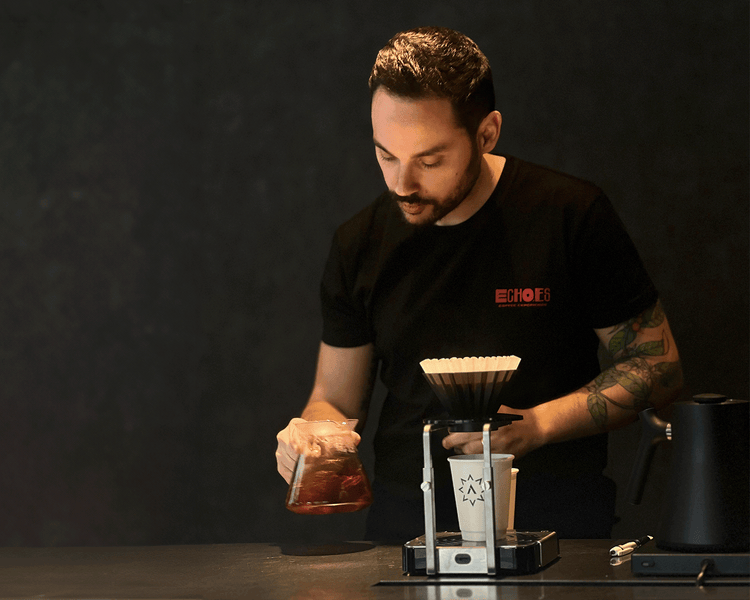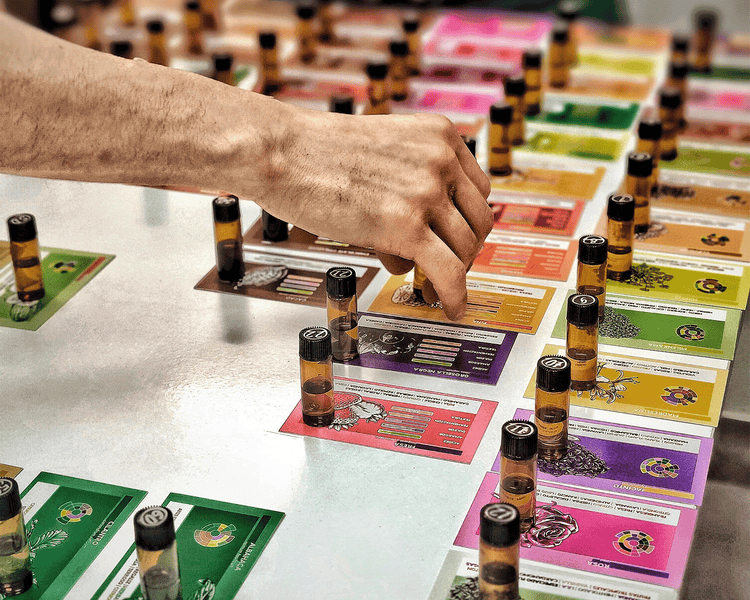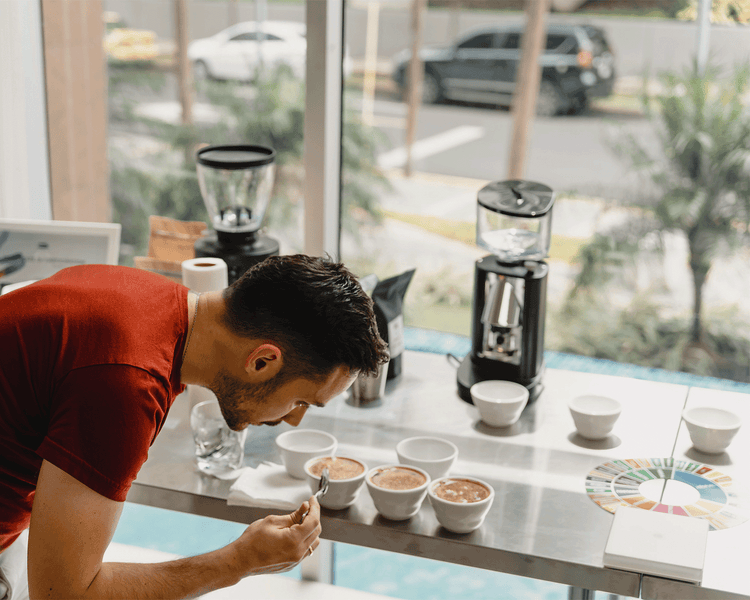SCA Kahvenin Duyusal Analizi Eğitimi
- Normal fiyat
- 30,000.00₺
- Normal fiyat
-
- İndirimli fiyat
- 30,000.00₺
- Birim fiyat
- /
Temel + Orta Seviye Kombo Eğitim
Kahve eğitmeni ve danışman AST John Vaz Matias'ın vereceği eğitim, kahvenin duyusal analizine dair teorik ilkeler ve uygulama pratiklerini içeren bütünsel bir bakış açısı sunar.
İki gün sürecek bu program ile, duyusal girdilerin lezzet anlayışınızı nasıl şekillendirdiğine dair içgörü kazanabilir, kahvenin duyusal özelliklerini anlama ve kalite değerlendirmesine dair becerilerinizi geliştirebilir, cupping protokolü gibi sistematik duyusal analiz testlerinin nasıl yapılacağını öğrenebilirsiniz. İkinci gün sonunda yapılacak uygulamalı sınavlarda başarılı olduğunuzda, online teorik sınavlara hak kazanarak SCA Sertifikası sahibi olabilir ve kahve alanında profesyonel bir şekilde ilerleyebilirsiniz.
* 7-8 Eylül tarihlerinde Casa Cooklife'da gerçekleşecek eğitim için katılımcı sayısı 6'dır. Eğitim dili İngilizce olup program sırasında eş zamanlı çeviri yapılacaktır.
Eğitim Hakkında:
Duyusal Analiz Temel Seviye
SCA Kahvenin Duyusal Analizi Temel Seviye Eğitimi, katılımcılara kahve alanında duyusal analizin kapsamlı bir anlayışını sunar. Duyusal analizin tanımı, tarihsel evrimi ve kahve endüstrisindeki uygulamalara uzanan konuları bütünsel olarak ele alır.
Katılımcılar, duyumlar ile algıları ayırt etmenin inceliklerine dalarken, duyusal girdilerin lezzet anlayışımızı nasıl şekillendirdiğine dair içgörü kazanır. Lezzeti tat, aroma ve gövde bileşenlerine ayırarak kahvenin duyusal özellikleri için nüanslı bir takdir geliştirir. Ek olarak eğitim, katılımcıları aroma çarkları ve duyusal sözlükler gibi araçlarla doğru duyusal değerlendirme için donatarak duyusal profillerin analizini yapar.
SCA Cupping protokolü gibi değerlendirme formları ve puanlama sistemlerini kullanarak sistematik duyusal analiz testlerin nasıl yapılacağını öğrenen katılımcılar, aynı zamanda kahve kalitesini değerlendirme ve lezzet özelliklerini anlama konusundaki yeni bilgilerini etkili bir şekilde uygulayabilir.
Duyusal Analiz Orta Seviye
SCA Kahvenin Duyusal Analizi Orta Düzey Eğitimi, önceki Temel Eğitim'de edinilen bilgileri referans alarak katılımcılara kahve kapsamında duyusal analizin daha derin bir anlayışını sunar.
Temel eğitiminde tanıtılan duyusal analiz kavramlarına genel bir bakışla başlayarak katılımcıların, duyuşsal duyumları daha bilimsel ve analitik bir bakış açısından anlamaları için derinleştirilir. Duyusal analizin amaçlarını ve zorluklarını, algıları etkileyebilecek psikolojik önyargıları anlamak üzerinde durulur.
Katılımcılar, analitik, ayrımcı ve hedonik testler de dahil olmak üzere farklı türde duyusal analiz testleri hakkında bilgi edinir; üçleme, çift üçlü testler, DFC (kontrolden fark) testleri ve karşılaştırmalı testler gibi pratik uygulamaları keşfeder.
John Vaz Matias Hakkında:
John Vaz, kahve üreticisi ülkelerde yaşamış ve Avrupa, Asya, Latin Amerika ve Amerika Birleşik Devletleri'nde çeşitli şirketler ile çalışmış uluslararası deneyime sahip bir kahve eğitmeni ve danışmanıdır. Aynı zamanda resmi bir SCA eğitmeni olup aroma çarkları, duyusal sözlükler ve aroma kitleri gibi çeşitli öğrenme araçlarının yaratıcısıdır.
John Vaz Matias
Teslim alım stok durumu yüklenemedi
